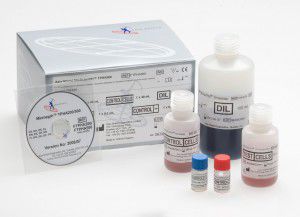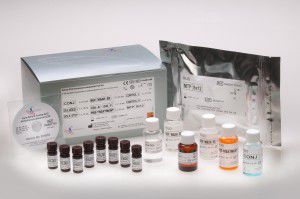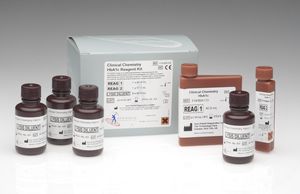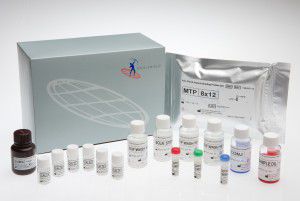
- Laboratory
- Laboratory medicine
- Rapid syphilis test
- Axis-Shield PLC
Rapid syphilis test FTPHA200Treponema pallidumserumplasma
Add to favorites
Compare this product
fo_shop_gate_exact_title
Characteristics
- Applications
- syphilis
- Micro-organism
- Treponema pallidum
- Sample type
- serum, plasma, clinical, laboratory, biological
- Analysis mode
- hemagglutination, automated
Description
Syphilis is a venereal disease caused by the spirochaete microorganism Treponema pallidum. As this organism cannot be cultured in vitro the diagnosis of syphilis depends on the correlation of clinical data with the specific antibody demonstrated by serological tests.
Serological screening tests for syphilis utilising cardiolipin and lecithin as antigens are simple to perform but biological false positive (BFP) reactions occur frequently because these tests use non-treponemal antigens1. The TPI and FTA-ABS tests utilise pathogenic T. pallidum as the antigen but these tests present some difficulties for routine serodiagnosis. The TPI test requires living pathogenic T. pallidum and the FTA-ABS test requires a fluorescence microscope. Both tests require a high level of expertise.
TPHA assays have been shown to be a convenient and specific test for the diagnosis of treponemal infection, having a specificity similar to that of the TPI test and a sensitivity comparable to that of the FTA-ABS test. It requires minimal laboratory equipment and is very simple to perform. It can be used in conjunction with automated liquid handling systems for improved throughput in the busy laboratory.
Convenient and specific test for treponemal infection
Minimal equipment required
Simple to perform
Easily adaptable to automated liquid handling systems for improved throughput
Intended Use
MICROSYPH TPHA200 is a rapid assay for the detection of specific antibodies to Treponema pallidum in human serum or plasma (either di-potassium EDTA, sodium citrate or lithium heparin) by indirect haemagglutination. The kit may also be used for semi-quantitative titration of positive samples.
Catalogs
SyphScreen RPR (FRPR500)
2 Pages
Related Searches
- Assay kit
- Blood assay kit
- Serum assay kit
- Immunoassay assay kit
- Plasma assay kit
- Infectious disease detection kit
- Blood rapid diagnostic test
- Serum rapid diagnostic test
- Plasma rapid diagnostic test
- Clinical assay kit
- ELISA assay kit
- Bacteria rapid diagnostic test
- IgG test kit
- Strip detection kit
- Laboratory detection kit
- Cell assay kit
- Antibody assay kit
- Clinical rapid diagnostic test
- Cardiovascular disease assay kit
- Biochemistry assay kit
*Prices are pre-tax. They exclude delivery charges and customs duties and do not include additional charges for installation or activation options. Prices are indicative only and may vary by country, with changes to the cost of raw materials and exchange rates.











